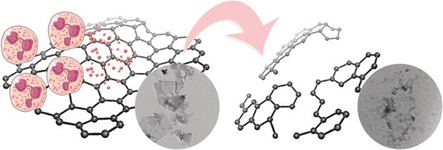
Dr Rajendra Kurapati
Assistant Professor Grade I (Chemistry)
+91 (0)471 - +91-4712778306
rkurapati@iisertvm.ac.in
Our group research interests lie at the interface of Materials Science, Biology, and Bioengineering.
State-of-the-Art: Developing Functional Biodegradable Materials for Biomedical Applications to prevent the long-term adverse effects due to the non-degradability of nanomaterials and for better clinical translation of biomaterials (e.g., Au, Ag, CNTs accumulated in the liver and spleen).
We employ 2D materials such as graphene oxide, MoS2, MXenes, etc., in combination with biopolymers or biominerals for developing degradable biomaterials for Drug/Gene Delivery, Nanotheranostics, Biomimetic Systems, and Antimicrobial Coatings to tackle multidrug resistance bacteria including pandemic virus-like COVID-19.
Biodegradable Drug Carriers: Hybrid Nanoparticles for Synergistic Chemo-photothermal Therapy (Funded by the DBT-Ramalingaswami Fellowship 2020-21)
Biodegradability of Nanomaterials: Evaluation of the ability of peroxidases secreted by immune cells to oxidize/degrade the emerging 2D materials such as black phosphorus, MXenes, etc., and intracellular (macrophages) stability of 2D materials and their cytotoxicity. E.g., Biodegradation of Graphene by human enzymes. (Funded by SERB through Start-up Research Grant 2022 for the next 2 years)
One of our recent works about Biodegradability of Carbon Nano-onions (CNOs) was highlighted on the Front Cover Page of ChemNanoMat 2024: https://aces.onlinelibrary.wiley.com/doi/10.1002/cnma.202480601


Anti-Biofilm and Antifouling Coatings for the Medical Implants: Graphene composite materials are being investigated as the anti-biofilm coatings and antifouling paints to prevent the biofilm formation on the medical implants and corrosion of ships using the inherent antimicrobial properties of 2D materials like graphene in combination with other functional materials.
